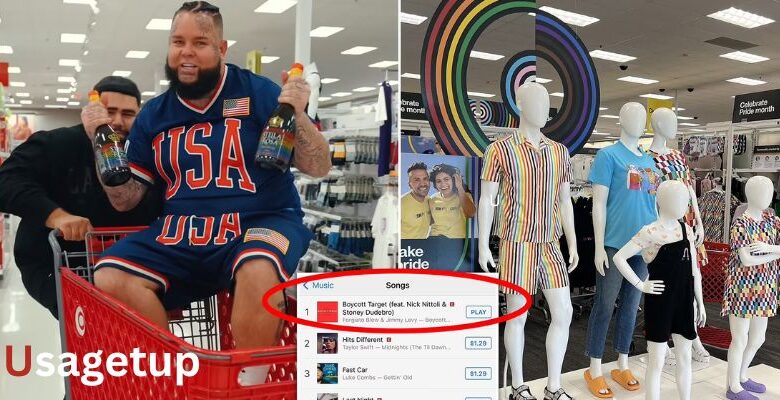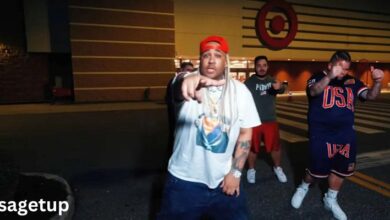Understanding the ‘Boycott Target Song’: Reasons, Reactions, and Impact Introduction

The Boycott Target song has recently stirred quite a commotion. As consumers express their dissatisfaction with Target’s policies, this song has become an anthem for the movement. The lyrics resonate with many who feel strongly about the issues at hand, sparking debates across various platforms.
In response to the rising discontent, the Boycott Target song has provided a voice for the movement, rallying people to take a stand. By encapsulating the frustrations of many, the song has turned into a powerful tool for advocacy. It encourages consumers to make informed choices and consider the impact of their spending habits.
Curious to know more about the origins and impact of the Boycott Target song? Keep reading to explore the full story, the public’s reaction, and the broader implications of this viral movement.
Background and Context of the Boycott Target Song
The “boycott Target song” began as a form of protest against certain policies and actions taken by Target. The song’s lyrics address specific grievances, which resonated with many who felt similarly. The context of this boycott is rooted in broader social and economic issues that have been bubbling under the surface for some time. By examining the history and events leading up to the creation of this song, we can better understand why it has become a rallying cry for so many.
Target, as a major retailer, has faced numerous criticisms over the years, from labor practices to corporate policies. The song encapsulates these criticisms, bringing them to the forefront in a way that has garnered significant attention. Understanding the background helps us appreciate the depth of feeling behind the boycott and the reasons it has gained such traction.
Key Players and Entities Involved
Several key players and entities are involved in the “Boycott Target song” movement. The artists behind the song play a crucial role, using their platform to voice concerns that resonate with a broad audience. Additionally, various advocacy groups have joined the movement, amplifying the message through social media and other channels. These groups include consumer rights organizations, labor unions, and social justice activists.
On the other side, Target and its executives have also become central figures in this saga. Their responses and actions have been closely scrutinized, with many looking to see how the company addresses the criticisms raised. Understanding who is involved helps us see the multifaceted nature of this boycott and the various interests at play.
Reasons Behind the Boycott
The reasons behind the boycott are varied and complex. One primary grievance is Target’s labor practices, with critics arguing that the company does not provide fair wages or working conditions. Additionally, some have taken issue with Target’s corporate policies, including its stance on certain social and political issues. The song highlights these and other concerns, making a compelling case for why a boycott is necessary.
Another significant reason for the boycott is related to environmental issues. Critics argue that Target’s business practices contribute to environmental degradation, and they call for more sustainable practices. By addressing these issues in the song, the artists have tapped into a broad base of support from those who care deeply about social justice and environmental sustainability.
Public and Media Reactions
The public and media reactions to the “Boycott Target song” have been mixed. On one hand, many people have embraced the song’s message, leading to widespread support for the boycott. Social media has played a significant role in spreading the message, with hashtags and viral posts helping to galvanize support. This has put considerable pressure on Target to respond and take action.
On the other hand, some media outlets and public figures have criticized the boycott, arguing that it is misguided or unfair. They point to Target’s positive contributions and question whether a boycott is the best way to effect change. These differing reactions highlight the contentious nature of the boycott and the strong feelings it has provoked on both sides.
Impact on Target and Its Brand
The impact of the boycott on Target and its brand has been significant. Sales have been affected, with some customers choosing to shop elsewhere in support of the boycott. This has led to a noticeable dip in revenue, which has caught the attention of Target’s executives and shareholders. The company has been forced to address the criticisms head-on, making public statements and implementing changes to mitigate the impact.
In addition to financial repercussions, the boycott has also affected Target’s brand image. The company, which has prided itself on being a family-friendly and socially responsible retailer, now finds itself under intense scrutiny. This shift in public perception poses a long-term challenge for Target as it seeks to rebuild trust and loyalty among its customers.
Social Media Influence on the Boycott
Social media has played a pivotal role in the spread and influence of the “boycott Target song.” Platforms like Twitter, Instagram, and TikTok have been instrumental in amplifying the message, with users sharing the song, using related hashtags, and encouraging others to join the boycott. Influencers and celebrities have also lent their support, further boosting the movement’s visibility.
The viral nature of social media means that messages can spread rapidly, reaching a wide audience in a short amount of time. This has helped the boycott gain momentum and put pressure on Target to respond. The use of social media also allows for real-time updates and engagement, keeping the conversation dynamic and ongoing.
Legal and Ethical Considerations
The boycott has raised several legal and ethical considerations. Legally, boycotts are generally protected as a form of free speech, but there can be limitations depending on the jurisdiction and the specific actions taken by participants. Those involved in the boycott need to be aware of their rights and responsibilities to avoid legal repercussions.
Ethically, the boycott raises questions about the effectiveness and fairness of such actions. Some argue that boycotts can be a powerful tool for social change, while others contend that they can unfairly harm businesses and employees. These ethical debates are an important part of the conversation, as they help to frame the broader implications of the boycott.
Future Implications and Predictions
Looking ahead, the future implications of the “boycott Target song” are uncertain but significant. If the boycott continues to gain traction, it could lead to substantial changes in Target’s policies and practices. This, in turn, could set a precedent for other companies facing similar criticisms. The success or failure of the boycott will likely influence future movements and their strategies.
Additionally, the boycott could have lasting effects on consumer behavior. Increased awareness of corporate practices may lead more people to make ethical and informed choices about where they shop. This shift in consumer attitudes could have a profound impact on the retail industry as a whole.
How to Participate in the Boycott
For those interested in participating in the boycott, there are several practical steps to take. Firstly, stop shopping at Target and encourage others to do the same. Share information about the boycott on social media and use relevant hashtags to spread the message. Support businesses that align with your values and advocate for the changes you want to see.
Additionally, consider reaching out to Target directly to voice your concerns. Companies are often more likely to make changes when they hear directly from their customers. By participating in the boycott and taking these steps, you can contribute to the broader movement for change.
Alternatives and Other Movements
While boycotting Target, it is important to support alternative businesses that align more closely with your values. Look for companies that have strong labor practices, environmental sustainability initiatives, and socially responsible policies. Supporting these businesses can help drive positive change in the market.
Additionally, consider joining other related movements that address similar issues. Many organizations are working towards social justice, environmental sustainability, and corporate accountability. By supporting these movements, you can contribute to a broader effort to create a more just and equitable world.
Conclusion
In conclusion, the “Boycott Target song” has sparked a significant movement that highlights important social, economic, and environmental issues. The reasons behind the boycott are varied and complex, but they all point to a desire for change. The public and media reactions have been mixed, reflecting the contentious nature of the boycott.
The impact on Target has been substantial, affecting both sales and brand image. Social media has played a crucial role in spreading the message and galvanizing support. Legal and ethical considerations add another layer of complexity to the issue, while future implications suggest that the boycott could have lasting effects.
If you are interested in participating in the boycott, there are practical steps you can take to support the movement. Additionally, consider supporting alternative businesses and other related movements. By doing so, you can help drive positive change and contribute to a more just and equitable society.
FAQ’s
What is the ‘boycott Target song’?
The “Boycott Target song” is a protest song that criticizes Target’s policies and actions, leading to a movement calling for a boycott of the retailer.
Who created the ‘boycott Target song’?
The song was produced by artists who aimed to highlight specific grievances against Target, resonating with a broad audience of supporters.
Why are people boycotting Target?
People are boycotting Target for various reasons, including labor practices, corporate policies, and environmental concerns.
How has Target responded to the boycott?
Target has made public statements and implemented changes in response to the boycott, but the effectiveness and sufficiency of these actions are still being debated.
What role has social media played in the boycott?
Social media has been instrumental in spreading the message of the boycott, with viral posts and hashtags helping to galvanize support and put pressure on Target.
Are there legal implications for participating in the boycott?
Boycotts are generally protected as a form of free speech, but participants should be aware of their rights and responsibilities to avoid legal issues.
What are the future implications of the boycott?
The boycott could lead to substantial changes in Target’s policies and practices and may influence future movements and consumer behavior in the retail industry.
How can I participate in the boycott?
To participate, stop shopping at Target, share information about the boycott on social media, and support businesses that align with your values.
What alternatives to Target can I support?
Look for companies with strong labor practices, environmental sustainability initiatives, and socially responsible policies to help instead of Target.
What other movements are related to the ‘boycott Target song’?
Many organizations are working towards social justice, environmental sustainability, and corporate accountability that you can support to contribute to broader efforts for change.
Read also: Boycott Target Lyrics: A Thorough Examination and Conversation





